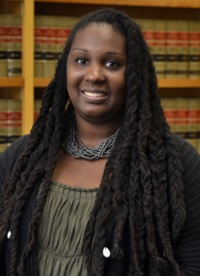Charisa Smith, JD, MA

Role: Hastie Fellow, University of Wisconsin Law School
Atlanta, GA
Contact: csmith64@wisc.edu
Research Interests:
Family Law
|
Child Welfare
|
Juvenile and Criminal Justice
|
Education Law
|
Alternative Dispute Resolution
|
Critical Theory
Charisa Smith is the 2015-2017 Hastie Fellow at the University of Wisconsin Law School. Smith focuses on the state's impact on the intimate lives of families and children. She explores the impact of legal norms and processes upon members of society while questioning rights-based approaches. Smith's recent articles in the Stanford Law & Policy Review, Law & Psychology Review, the Charlotte Law Review, the Quinnipiac Health Law Journal, and the Journal of Applied Research on Children have addressed the legal treatment of parents with mental disabilities and the efficacy of the current juvenile justice system. Her forthcoming work focuses on statutory responses to the domestic sex trafficking of minors, the legal treatment of "sexting" and cyberbullying by children, and discrimination in special education law. Smith applies lessons from psychological, anthropological, and human rights literatures to articulate theoretical frameworks that can improve the law's effect upon society and the economy. Smith likewise incorporates Vulnerability Theory and critical theories to address the limits of those literatures, and to argue for a more egalitarian purposing of law and public systems.
In particular, Smith’s in-progress LL.M. thesis entitled “When Dispute Systems Design Hits Home: Examining Alternative Dispute Resolution in Child Welfare Cases” engages Vulnerability Theory to confront the flaws in adversarial court proceedings that rely on concepts of the liberal, autonomous subject as a litigant. Joining Vulnerability Theory with feminist theory and critical race theory, Smith deconstructs notions of autonomy and independence among litigants including parents, children, and state child welfare agencies, to acknowledge these parties’ fundamental interdependence and their shared vulnerability in seeking safety and wellbeing for the families involved. While exploring different models of alternative dispute resolution in the child welfare context through the lens of Dispute Systems Design, Smith notes how traditional rights-based, adversarial proceedings create spaces of privilege and disadvantage despite the goal of protecting the parties. Further, the privileges and disadvantages shaped by family court are not limited to a distribution among traditionally oppressed identity groups, but involve concepts of universal vulnerability over lifespans.
Smith has received numerous distinctions, including the Arthur Liman Public Interest Law Fellowship, the Mary McCarthy Fellowship, and the Schell International Human Rights Fellowship (all from Yale Law School). She has worked for women's rights organizations in Latin America, researching rural women's land ownership and political participation. Smith has also worked with sexually exploited children in the Dominican Republic and New York City. She received her bachelor's degree cum laude from Harvard and was awarded the Harvard History Essay Prize, among others.
